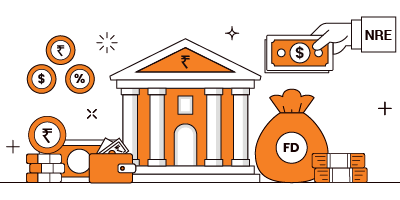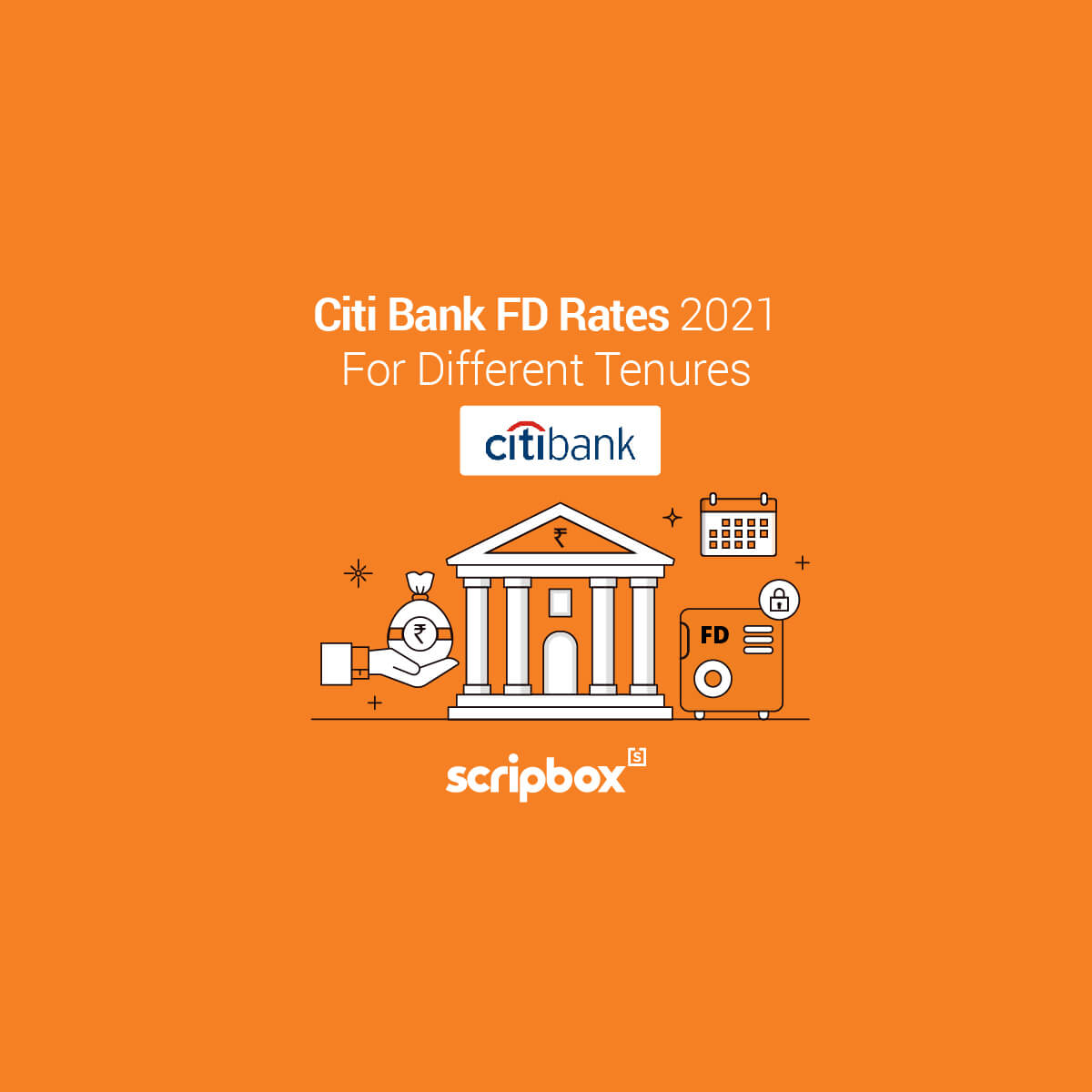NRE FDs are a quite popular investment option available to NRIs in India. They come with an array of features and benefits. This article has covered NRE FD schemes, its features, benefits, and interest rates in detail.
What is an NRE Fixed Deposit?
Non Resident External (NRE) FD account is an account with where the NRI’s can deposit their foreign currency into an India account. The NRE account is in Indian rupees and is completely tax free. Non Resident Indians’ (NRI’s), Persons of Indian Origin (PIO’s), and Overseas Citizen of India (OCI’s) can invest in NRE deposits through NRO and NRE accounts.
The NRE fixed deposit interest rates vary with different banks and tenures. However, the fixed deposit rates that different banks offer are up to 8% per annum. The returns from NRE FDs can be calculated using a fixed deposit calculator. Scripbox’s FD calculator is available online and is free to use.
The tenure of the FDs range between 1 year and 10 years. Moreover, the investment and the interest that one earns from the FD are completely tax free in India. They can get the tax benefit under Section 80C of the Income Tax Act.
Following are the features of NRE FDs:
- Money is deposited only in Indian currency. One can easily open an NRE FD account through internet banking.
- Tenure of the FDs range between 1-10 years.
- Fixed deposit rates go up to 8% per annum. Moreover, the returns from NRE FDs can be calculated using a fixed deposit calculator. Scripbox’s FD calculator is available online and is free to use.
- The FD account can be closed any time from the time of opening it.
- Banks offer auto-renewal facilities on the NRE FDs.
- Few banks allow investors to take loans against fixed deposits. Also, investors can take up to 90% of the deposit amount as loan. The loan interest rate, tenure and terms are decided by the respective banks.
- Banks allow nomination facility and few banks also allow investors to invest jointly in an NRE FD.
- The premature withdrawal facility is available on NRE FDs, and the rules of the individual banks apply for investors to avail this facility.
- The minimum and maximum amount of deposit depends on the individual bank’s rules.
- The NRE FD is covered under the DICGC insurance. Hence investors can claim up to INR 5 lakh compensation, in case the bank defaults.
NRE Fixed Deposit Interest rate in 2026
The following table compares NRE FD interest rates across different banks:
| Name of the Bank | NRE Interest Rates | Senior Citizen NRE Interest Rates |
| SBI | 6.80% – 7.10% | NA |
| Standard Chartered Bank | 7.15% – 7.50% | NA |
| HDFC Bank | 3.00% – 7.25% | 3.50% – 7.75% |
| ICICI Bank | 6.70% – 7.20% | NA |
| PNB | 6.75% – 7.25% | NA |
| SBM Bank | 7.10% – 8.25% | NA |
| Axis Bank | 6.70% – 7.20% | NA |
| Canara Bank | 6.85% – 7.25% | NA |
| Kotak Mahindra Bank | NA | NA |
| Bank of Baroda | 6.85% – 7.25% | NA |
| Bank of India | 6.80% – 7.25% | NA |
| IDBI Bank | 6.80% – 7.00% | NA |
| IndusInd Bank | 6.50% – 6.75% | NA |
| Central Bank of India | 6.75% – 7.00% | 4.90% |
| Citibank | 6.70% – 7.20% | NA |
| Indian Overseas Bank | 5.75% – 6.50% | NA |
| DBS Bank | 5.00% – 7.00% | NA |
NRE Fixed Deposit Small Finance Bank Interest rate in 2026
The Government of India has licensed a few companies to operate as financial institutions and small finance banks. These are not scheduled commercial banks but offer niche services. Fixed deposit is one of the services offered by these Small Finance Banks. The following table shows the best interest rates for an NRE fixed deposit in India:
| Small Finance Bank | NRE Interest Rates | Senior Citizen NRE Interest Rates |
| AU Small Finance Bank | 6.50% – 8.00% | NA |
| ESAF Small Finance Bank | 6.00% – 8.25% | NA |
| Equitas Small Finance Bank Limited | 7.25% – 8.50% | NA |
| Ujjivan Small Finance Bank | NA | NA |
Benefits of NRE Fixed Deposits
Following are some benefits of NRE FD accounts:
- Investments in FD accounts can be made using Indian currency. Moreover, one can easily open an NRE FD account through internet banking.
- NRE FD deposits are completely tax free. In other words, both the principal amount and as well as the interest earned is tax exempted. They can get the tax benefit under Section 80C of the Income Tax Act.
- Both principal and interest are freely repatriable to the depositor’s country of residence.
- The NRE FD interest rates are higher in comparison to a regular savings account.
- NRI depositors can choose a tenure ranging between 1 to 10 years.
- To meet financial emergencies, the NRE term deposit account allows premature closure of the account.
- Some banks offer overdraft facilities up to 90% of their NRE term deposit amount. And also, one can avail loans against fixed deposits.
- Upon maturity, the NRE FDs are auto renewed. In other words, the amount is automatically reinvested.
- Some banks allow depositors to open NEW FD accounts jointly. Also, depositors can nominate their family members.
- Deposit Insurance and Credit Guarantee Corporation (DICGC), insures NRE deposits up to INR 5,00,000.
Who can invest in an NRE Fixed Deposit?
Non Resident Indians (NRIs) can easily invest their foreign currency in a Non-Resident External fixed deposit. However, they will have to meet the eligibility criteria. The NRIs foreign currency is remitted to the Indian bank account. NRE accounts are held in Indian Rupees and are completely tax free.
As per the Foreign Exchange Management Act (FEMA) guidelines, NRIs cannot open a normal account.
One should meet the following eligibility criteria to open an NRE Fixed Deposit in India:
- Should be a Non-Resident Indian (NRI) or Person of Indian Origin (PIO)
- Should have an NRE Savings Account
Also, the following are the documents required to open an NRE fixed deposit account:
For NRI
- Recent passport size photograph
- Indian Pan card or Form 60
- Copy of Passport
- Proof of NRI status – Residence/ Employment Visa copy or Work / Residence permit
- Address proof (India and overseas) as per Customer Identification Policy
For PIO
- Recent passport size photograph
- Valid Passport
- Valid PIO or OCI card or any other proof of PIO status as per Customer Identification Policy
- Address proof (India and overseas) as per customer identification policy
- Duly filled and signed PIO declaration.
Difference between an NRE account and NRO account
NRE saving account and NRO saving account are both opened and managed by NRIs. However, their similarity ends there. Following are the differences between the NRE & NRO accounts.
- NRE or Non Resident External account is an account that lets an NRI park their foreign earnings in Indian currency. An NRO or Non Resident ordinary account allows an NRI to park their Indian earnings in Indian currency.
- One can open an NRE savings account jointly with another NRI or a close resident Indian relative. Whereas, an NRO account can be opened with another NRI or a resident Indian.
- Any deposits made in an NRE account is tax free. The principal amount, balance and interest earned are completely tax free. On the other hand, the interest earned in NRO accounts is subject to TDS.
- The principal and interest that one earns from an NRE account are freely and completely transferable. Whereas, the NRO account funds are transferable subject to a limit of USD 1MN in a financial year, post the payment of all applicable taxes.
- NRE accounts are suitable for NRIs who want to keep their foreign earnings in Indian currency and in a liquid form. On the other hand, NRO accounts are suitable for NRIs who want to keep their Indian earnings in Indian currency itself.
explore our article on demat account for nri
Conclusion
Amidst the wide range of investment options, it’s often a tough decision to pick one. However, there are certain factors that one should keep in mind while going ahead. For example, a fixed deposit interest rate and a trustworthy bank as it is going to be a long term relationship. It is also very important to check if the account can be operated from the depositor’s country of residence. For instance, some banks have their branches in countries like the UK, the Middle East and the USA.
Despite being a very traditional investment product, FDs are quite popular even today. It is always advised that investors practice some caution while investing in NRE FDs.
























Show comments